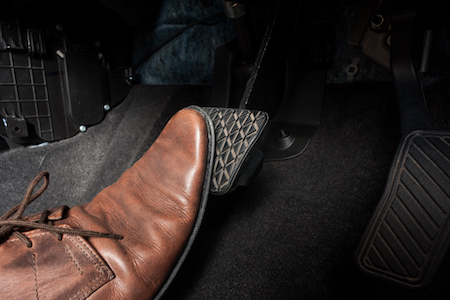When people replace old brake pads, it’s usually because they are old, worn down, and making a horrible noise. It’s hard to ignore that high-pitched squeak every time you press down on the brake pedal.
So it can be disheartening when you drive away from the mechanics, step on the brake pedal, and discover your brakes are still making a noise. What is that squeak? And why is it making that sound? There’s a good reason for that.
Why old brakes squeak
Before we dive into why your new brakes are squeaking, let’s build up your understanding of how the brake system works.
Brakes are one of the most crucial systems on your vehicle. Without them, you could be put in dangerous, even life-threatening situations on a daily basis.

That’s why brake pads have their own internal warning system to alert you to a potential problem. As the brake pad wears down, metal is revealed within the brake pad to connect with the rotor as you apply pressure to the brakes. This metal-on-metal connection creates a squeak you can’t ignore.
It’s for safety.
So why would new brakes squeak?
When you replace the brake pads, the metal core is no longer visible, so the sound should disappear.
But sometimes it doesn’t. What could be the problem?
Road debris
Even living right here in the Denver Metro area can provide you with many different driving experiences. Do you live in the Foothills, driving up and down steep hills each day? Do you live just outside of town in a rural area, where dirt roads are a normal part of your routine? Or maybe it’s highway all the way. But those potholes and road debris can sometimes be quite alarming.
Even urban driving can have a minefield of potential problems on the roadway. Rocks, sticks, nuts and bolts, acorns, stones, and more can all harm your vehicle in many ways. As you drive away from the mechanics, a small piece of debris can make its way up and get stuck between the brake pad and the rotor. Do you hear the sound even without pressing down on the brake pedal? That’s most likely the case.
Pay attention for the next few miles. It may work its way out of the system, or break down without causing more issues. If you still hear it, bring it in for a second look.
Moisture
It might be the weather. As you drive a few dozen miles after installing new brakes, what road conditions have you faced? Ice? Snow? Rain? Wet pavement? All of that can form a thin layer of condensation between the brake pads and the brake rotor. This can lead to a thin layer of rust on the rotor, which can break off into tiny pieces and stick to the brake pad. This causes a squeaking noise as the two connect.
In most cases, this noise will disappear after pressing down on the brake pedal a few times. If it doesn’t, bring it in and we’ll take a look.
Break-in period
When brake pads are replaced, the brake rotors are removed, measured, machined, and possibly replaced. They need to have a smooth, flat surface to ensure good connection between the rotors and the brake pads.
If this process doesn’t occur, the connection might not be a close fit. That can allow several things to occur, including glazing.
Glazing is a hardening process that creates a smooth pad surface. This makes it difficult to create the necessary friction for stopping the vehicle.
It can happen with repeated rapid braking where you stomp on the brakes. Or if you drive with your foot on the brake pedal, keeping the brake pad constantly connected with the brake rotor. That excess heat causes glazing. And you might hear it in the form of a squeak.
Brake pad material
Not all brake pads are the same. There are several different brake pad materials, depending on which you have installed.
Most cars on the road today use semi-metallic brake pads. They’re created from metal shavings of copper, steel, graphite, and brass, bonded with resin. They are best suited for vehicles used for everyday driving. They perform well, last a long time, and are economical.
Organic brake pads are quieter than other materials. They are created from non-metallic compounds such as glass, rubber, and Kevlar. They are eco-friendly, which is why some drivers prefer them. Yet they aren’t as durable and will need replacing sooner. They are designed for lighter traffic situations.
Ceramic brake pads are best suited for high-performance vehicles. They are made from ceramic fibers and other materials. They are very durable and perform well in many different situations.
Different brake materials create different sounds on your vehicle. While you may be used to the way your vehicle performed before, it might take an adjustment to your new brake sounds. If you have any questions, give us a call.
Quality
Where did you go to have your brake pads replaced? While we strive to deliver quality service every time, we can’t say the same for every mechanic.
This is where reputation comes into play. When you get to know a mechanic, you build a relationship with the service they provide. You have a better understanding of the work they do.
Going with a “good deal,” or even a friend down the road can lead to serious consequences.
Did the technician you entrusted brake replacement to provide full-service? Did they install high-quality brake pads? Did they spend the extra time cleaning and lubricating the various brake system parts?
Are your new brake pads squeaking?
When you replace old brake pads, your new brake pads should work well. If you hear squeaking, squealing, or some other sound, it should disappear after a few miles. If not, bring it in for a second look.
What brake questions can we answer for you?
